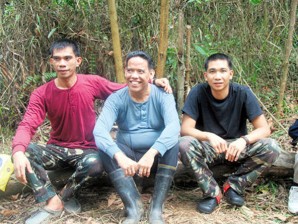
FREED. Communist rebels release Lingig Mayor Henry Dano (center) and his two military escorts in Trento, Agusan del Sur, on humanitarian grounds. DENNIS JAY SANTOS/INQUIRER MINDANAO
TRENTO, Agusan del Sur—The communist New People’s Army (NPA) on Sunday freed Mayor Henry Dano of Lingig, Surigao del Sur, and his two military escorts from over two months of captivity in a move which Malacañang said could advance the peace process.
Dano, Corporal Alrey Desamparado and Private First Class Allan Saban were turned over in this remote mountain town to representatives of the Geneva-based International Committee of the Red Cross and a local peace group, the Independent Humanitarian Mission.
On Saturday, the NPA also released in Quezon, Bukidnon, four jail guards who were abducted on July 21 while they were transporting to the Davao Penal Colony a group of prisoners one of whom, a communist guerrilla, was set free.
President Benigno Aquino III’s spokesperson, Edwin Lacierda, welcomed the release of the seven captives and urged the Communist Party of the Philippines (CPP) to “continue doing confidence-building measures.”
He said the government was doing its share “to show our sincerity toward advancing the peace process.”
Alex Padilla, the government’s chief negotiator in talks with the CPP-led National Democratic Front (NDF) that are expected to resume before the yearend, said the releases had nothing to do with the peace process, pointing out that the abducted men were “noncombatants.”
“I am very happy now that I can have my freedom back. I can finally be reunited with my wife, family and constituents,” Dano told reporters.
He said he and his two escorts had been told three days ago they were to be freed on humanitarian grounds.
“They treated us well. They are like my brothers, sisters or even parents. All our needs, including medicines, were provided for,” Dano said.
Desamparado said he had lost hope after he and Saban were found by an NPA court guilty of espionage and other crimes.
Humanitarian grounds
The NPA, in a statement on October 2, said the soldiers had been meted out the death penalty by the “people’s court.”
Desamparado said that when he learned about the death sentence, he was so afraid that he planned to escape but changed his mind.
“Ka Loyd,” a representative of the NPA’s Merardo Arce Command, said the NPA stayed the execution of the soldiers on “humanitarian grounds” after they apologized for their crimes.
Dano, on the other hand, was accused of supporting a private army and helping the Army in gathering information against the rebels. He was also given another chance to live, but with a warning to mend his ways or he would be rearrested.
“It was an honest mistake and I had apologized,” Dano told reporters.
Dano described his abduction as a “wake-up call for government to take a serious look at the peace process.”
“Should they wait that many more mayors will be held hostage?” Dano asked.
Public apology
About 30 heavily armed guerrillas seized Dano and his escorts at the mayor’s home early on August 6, accusing the local official of committing human rights violations.
Dano’s release came two weeks after his captors released a video clip of him purportedly apologizing for alleged human rights violations.
The NPA said Dano was tried by its “people’s court,” which then decided to “archive” his case, leading to his release.
Freed earlier on Saturday were Inspector Murphy Todyog, Ozamiz City jail warden Erico Llamares, Senior Jail Officer 2 Rogelio Begontes and Senior Jail Officer 1 Rolando Bajoyo Jr., whom the rebels seized in Quezon, Bukidnon, while transporting prisoners to Davao del Norte, in July.
In an interview over state radio dzRB, Lacierda said the four Bureau of Jail Management and Penology officers should be considered noncombatants. “They should not be used as pawns in this war,” he said.
Ceasefire
In saying that the releases of the seven captives had nothing to do with the peace process, Padilla stressed that to say otherwise would mean “encouraging them to abduct civilians.”’
Padilla said the government had yet to decide whether it would demand a ceasefire agreement with the communist rebels in the wake of recent attacks by NPA guerrillas in mining areas in Mindanao.
He also said that the NDF, the umbrella organization for the rebels, did not want a ceasefire, pointing out that every time a truce was implemented, the rebels returned home and altogether abandoned the movement.
Padilla said this was the observation of the military.
“Maybe they want to go back home after 42 years and they miss their families,” he said, explaining why the rebels were no longer returning to the group after periods of cessation of hostilities.
Padilla said the government wanted a ceasefire agreement as this would “reduce the level of violence on either side” and would ensure that economic activities could push through without disruptions. With reports from Frinston Lim, Inquirer Mindanao, and Christine O. Avendaño in Manila